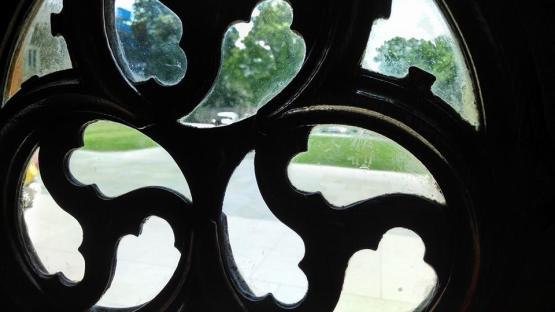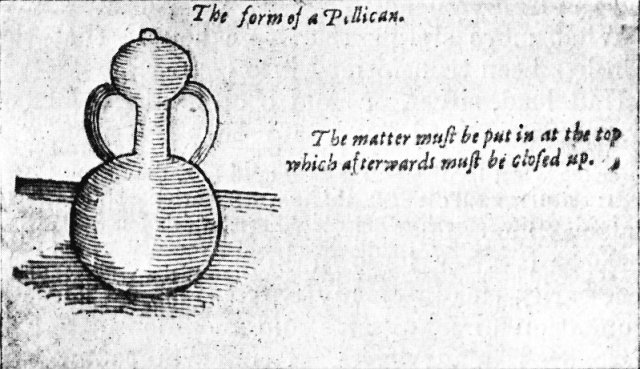Session Eight of the Jung Platform’s online class on James Hillman’s book, “Alchemical Psychology,” moves the work from forge to stove, in which the use of glass vessels for heating the material make alchemy both possible and psychological.
“Glass also separates observer from observed. It is the material of distancing, separating events from life by means of fragile transparency, enclosing them each in its own “house” as the glass vessels were sometimes called.” James Hillman
 Glass, like psyche, Hillman notes, is the medium by which we see into or through. In the furnace, Robbie points out that we can only see outcomes. Through the use of alchemical stoves we can see through or into the process as it happens, “without obstruction as if the glass is not even there.”
Glass, like psyche, Hillman notes, is the medium by which we see into or through. In the furnace, Robbie points out that we can only see outcomes. Through the use of alchemical stoves we can see through or into the process as it happens, “without obstruction as if the glass is not even there.”
Through its properties glass shapes, forms and colors the perception of the materials. Pat and Robbie liken language to glass, which I find very satisfying. When the medium of language loses its transparency, words can be mistaken for the thing they refer to. Glass allows us to be present to the material, “an inside view,” as Robbie calls it. But glass also contains – according to its own structure, presenting bite-sized, specific, particularizations of the material. Containing the material allows us to work on the particulars rather than generalizations.
Vulnerable to a build-up of sediment from the materials within, glass may lose its clarity, just as our habits, theories or preconceived ideas create a film through which we see the material. Part of the work, Robbie reminds us, is to keep the glass vessel clean, especially as we move from one aspect of the work to another.
I wonder if we are not distancing ourselves from the subtle qualities of things through mass production – from the food that we eat to the instruments used for everyday tasks; do we now risk losing the ability to notice the subtlety of substance – glossing over properties, only to increase our focus on defect of functionality? I’ll be the first to complain about poorer quality of tools and many mass-produced things we’ve come to rely on. Through their use we lose not only the skill in making them, but a familiarity and respect for the material world that can come only from working directly with the substances.
“Glass as subtle body requires a subtlety of noticing. The sophistication of the material needs sophistication of insight. The alchemical mind was occupied with noticing properties. Which qualities, which attributes, are the “virtues,” in Paracelsus’s terms, of a substance? Natural things could be grouped, even classified, by their adjectives: hard, cold, bitter, wintry, could bring together phenomena from all three kingdoms – animal, vegetable, mineral. Because the world is inherently intelligible we can discover where each phenomena belongs by means of the study of properties, care with adjectives.” James Hillman
Sophistication, Robbie notes, is refinement; returning again and again to the same material to see deeper into its properties. The difficulties that the material presents to us, which Robbie likens to any work that we do: dancing, painting, writing, speaking, or day-to-day problems, require going back over the material to refine and discipline the work. The refinement can also move literal meaning into poetic metaphor, lifting a more subtle sense of meaning out of the mundane.
The Bain Marie
Essentially a double boiler, the Bain Marie, a vessel thought to be of Egyptian origin, heats the materials with hot steamy air, warmed by water, heated on a stove. The Bain Marie allows fire and water, two notorious enemies, to cooperate. Slow and gradual heating allows for the material never to over heat as long as an ample supply of water is provided.
“The warmth permeating the glass vessel from the bath is another way of imaging sympathetic attention, gentle encouragement, all-embracing tolerance. Knots, boundaries, strictures give way.” James Hillman

A slow, gradual increase of temperature changes solids to liquids, breaking down the materials, and in adding to them, re-thickens, as in the making of sauces. Blending, rearranging the materials can put substances into new relationships with each other thereby creating something new.
“Perform no operation until all has become water: rational analysis must wait for emotion to flow, reveries to float, collect in pools, stir, sink, find outlets. Discriminations blur. This and that melt into each other; right and wrong and their guilts grow soft and mushy; they hardly matter, no hard facts, no sturdy sureties to cling to. All yields to the warming water. We become gentler with ourselves. We lose intention for arrival, no hurry. A bath is not a shower. We are the substance, our body and our mind enter the vessel of the soul, Mary’s bath. We are the cook and the cooked, unable to feel the difference.” James Hillman
The Pelican
The pelican, a glass vessel tightly enclosing the material, recirculates from bottom to top, performing an alchemical operation called iteration or repetition.
“The Pelican, too, is a tail-eater: the lower end is consumed by the upper end, the head, but the process does not stop there with mental reflection. The head sends its product down again into the body, repeatedly. A continuing circulation ensues. What arises to the head does not escape. As the substance melts, steams, sending vapors upward, cloudy ideas form, pressures increase, lighter, uplifting feelings swirl. But these inspirations and hot ideas are re-processed down as too unripe, too soft-boiled, too unreal. Rather, they are fed back into the vessel as further nourishment. It is the opus that must be fed, continued at all costs.” James Hillman
 The work inside the pelican is vital to alchemical psychology. Here is where both body and head are fed by shared images through containment and repetition. Feeding the body what is going on in psyche makes ideas matter. Feeding the head what the body feels psychologizes the body into metaphor.
The work inside the pelican is vital to alchemical psychology. Here is where both body and head are fed by shared images through containment and repetition. Feeding the body what is going on in psyche makes ideas matter. Feeding the head what the body feels psychologizes the body into metaphor.
Robbie suggests that the pelican, its shape and form, is itself refined much as our body is by the work happening within the pelican. The temptation here might be to release the refined insights from the top, or head, to enjoy a brief exhilaration at the expense of the iteration necessary for the work.
Hillman refers to the material worked in the pelican as sacrificial, much like the bird:
“Hence the term “Pelican,” since that bird, according to lore, drove its bill into its own breast to draw the blood that fed its young. Christ was this pelican, nurturing his faithful with his own life-blood. The pelican is thus a wounding, a repetitive ritual, a sacrifice, and a humiliation all at once. And, a necessary instrument for feeding the opus from within itself.
What arises during the work belongs to the work, not to the world. Before the vessel may be opened, its contents must be thoroughly psychologized, refined, sophisticated; its concretizations vaporized.” James Hillman
Here we see the importance of containment and repetition in the work, a need for privacy, to stew in our own juices before a creative work can be brought to fruition – something that can only be done when we admit to ourselves the necessity of the work, letting go of any desire for approval or progress. As Pat says, the realization that we are in a system, in process, is what makes the work alchemical.
The work is for its own sake, whether it be the work in therapy, art, dance, music, writing, or cooking, the focus within the work is the work. It does not aim at any static state, remove desires or bring peace, although we may experience a range of states in or from the work. Alchemical practice requires “the sacrifice of non-arrival.”
Thank you for enduring the extra length in these class notes. I’ll stop here with one last quote on the pelican:
“The Pelican offers an image for the wounding that the work causes. We feel the cost in blood. “Things must be cooked in their own blood,” is an oft-repeated admonition. We feel the draining in the body for what might come later but is now entirely unknown, the Pelican’s offspring, children of the imagination, for “Imagination bodies forth / The form of things unknown.” The Pelican: vessel of psychological faith, a phrase used by a keen student of alchemy, Robert Grinnell, for an attitude or a devotion that calls for nothing less than giving in, giving over to the opus all personal demands one has upon it, for its sake, come what may.” james Hillman
All quotes from Hillman, James (2011-10-10). Alchemical Psychology (Uniform Edition of the Writings of James Hillman). Spring Publications, Inc.. Kindle Edition.

Had to get caught up on the classed notes that I missed :). Thank you for taking the time to share these Debra. I think alchemical psychology is quite a fascinating subject and Hillman provides invaluable insight into how it relates to the our experience of life, reality, or whatever word we may use to describe the time between the first and final breaths. Great series!
LikeLike
Hi H3nry,
You’re very welcome! I am glad you are enjoying the series. The class has been fascinating and to think that in ten sessions we only finished the first chapter!
I so appreciate you and all who have taken the time to comment. It’s a bit of work to do the writing, but I must say, the writing brings me closer to the material too.
Thank you!
Debra
LikeLike
“The iteration of the work.” The re-distilling it in the pelican, enriching life, giving it over. This rings so true!
LikeLike
Thanks Jane!
It’s how we roll 🙂
LikeLike
“…rational analysis must wait for emotion to flow, reveries to float, collect in pools, stir, sink, find outlets. Discriminations blur. This and that melt into each other; right and wrong and their guilts grow soft and mushy; they hardly matter, no hard facts, no sturdy sureties to cling to…”
This is the challenge that has always been in front of me and I think in front of “us.” As we have become more and more reliant on the rational and dismissive of the intuitive, we are left longing. Longing for meaning in the everyday world. It is lacking and this leaves us feeling disconnected. Disconnected from what is not important, because I think once the sense of separateness happens, it will manifest in just about any “thing.”
Wonder full work
LikeLike
Debra:
I am very much enjoying your class notes. Would you be so kind to have a page or post that links all of them for ease of finding them. (It may exist but I am not able to find it :-). Thank you so much.
Hope you are having a wonderful weekend!
Peace,
W. Ockham
LikeLike
Hi William,
You can find all posts in the Index. I am thinking of adding a alchemy reference page…
Happy Memorial Day to you.
Peace,
Debra
LikeLike
Thank you Debra. Hope you have a wonderful week!
Peace,
W. Ockham
LikeLike
“When the medium of language loses its transparency, words can be mistaken for the thing they refer to.” So much to ponder here! Thank you!
LikeLike
Thanks Julieanne!
I’m glad you enjoyed it.
Debra
LikeLike